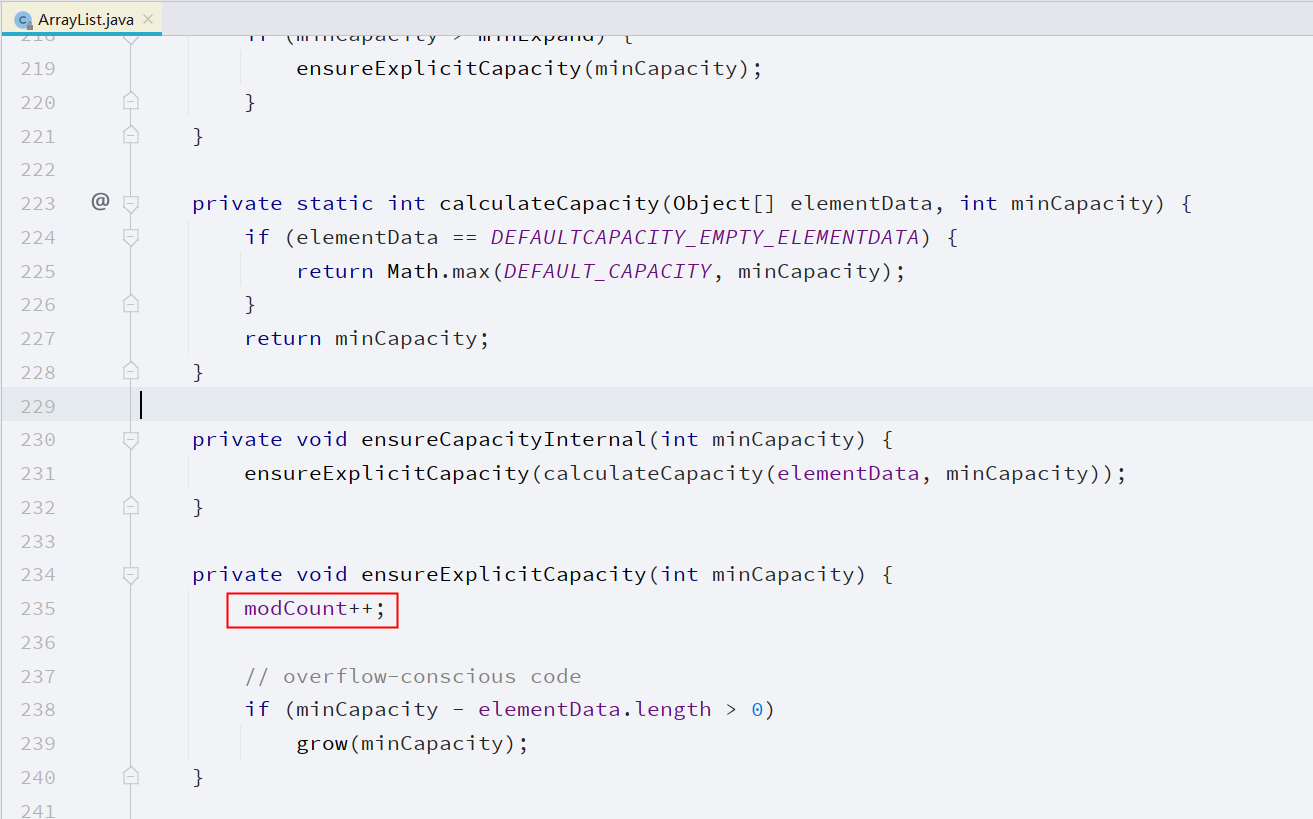背景:
刚入职公司的时候,就听到面试官在面试过程中提问ArrayList在for循环中remove的问题,当时很庆幸自己没被问到,一年后又一次听到面试在问这个问题。发现自己还没有深入研究一下,所以就有了今天这篇文章。
代码如下:
import java.util.ArrayList;
import java.util.List;
public class ArrayListTest {
public static void main(String[] args) {
List<String> list = new ArrayList<>();
list.add("aaa");
list.add("bbb");
list.add("ccc");
list.add("ddd");
for (String str : list) {
if ("aaa".equals(str)) {
list.remove("aaa");
}
}
}
}
以上代码的执行会导致以下异常:
Exception in thread "main" java.util.ConcurrentModificationException
at java.util.ArrayList$Itr.checkForComodification(ArrayList.java:909)
at java.util.ArrayList$Itr.next(ArrayList.java:859)
at future.ArrayListTest.main(ArrayListTest.java:14)
今天通过一种通俗易懂的方式说明代码异常的原因!
1️⃣list.add
通过查看 list.add 方法,发现有一个变量的值发生了改变,这个变量叫 modCount 。在上面demo中一共执行了四次 add 操作,所以 modCount 的值为4.
注:list 的 add()、remove() 和 clear() 都会改变 modCount 值。

2️⃣for(String str : list)
for(String str : list) 调用的是 ArrayList 的内部类 Itr ,Itr是对 Iterator 的实现。在 Iterator 开始之前,会先执行 modCount != expectedModCount 。
此时 modCount 和 expectedModCount 的值均为 4 .
3️⃣list.remove("aaa")
先看一下报错原因,这里是源码:
final void checkForComodification() {
if (modCount != expectedModCount)
throw new ConcurrentModificationException();
}
即 modcount 和 expectedModCount 的值不相等了。看到这里应该有人会想,如果每次执行 remove 后,将 expectedModCount = modcount 不就好了。其实是有的,只是我们调用的方法错了。
list.remove("aaa")调用的 remove 源码如下
public boolean remove(Object o) {
if (o == null) {
for (int index = 0; index < size; index++)
if (elementData[index] == null) {
fastRemove(index);
return true;
}
} else {
for (int index = 0; index < size; index++)
if (o.equals(elementData[index])) {
//走的是这个remove
fastRemove(index);
return true;
}
}
return false;
}
而使 modCount 的值改变的是其中的 fastRemove 方法。
fastRemove 源码如下:
/*
* Private remove method that skips bounds checking and does not
* return the value removed.
*/
private void fastRemove(int index) {
//此处 modCount + 1
modCount++;
int numMoved = size - index - 1;
if (numMoved > 0)
System.arraycopy(elementData, index+1, elementData, index,
numMoved);
elementData[--size] = null; // clear to let GC do its work
}
通过查看上面的源码发现 list.remove(E e) 方法执行完成后只执行了 modcount++,并没有将值赋给 expectedModCount。
而真正的 expectedModCount = modCount 执行的源码如下:
public void remove() {
if (lastRet < 0)
throw new IllegalStateException();
checkForComodification();
try {
ArrayList.this.remove(lastRet);
cursor = lastRet;
lastRet = -1;
expectedModCount = modCount;
} catch (IndexOutOfBoundsException ex) {
throw new ConcurrentModificationException();
}
}
该方法位于内部类 Itr 中。
这也就是说为什么如果 list 在循环中有删除操作,最好用 Iterator 的方式来做。
结论
简单总结一下
- list.remove() 没有对 expectedModCount 重新赋值
- iterator.remove() 每次 remove 之后会对 expectedModCount 重新赋值